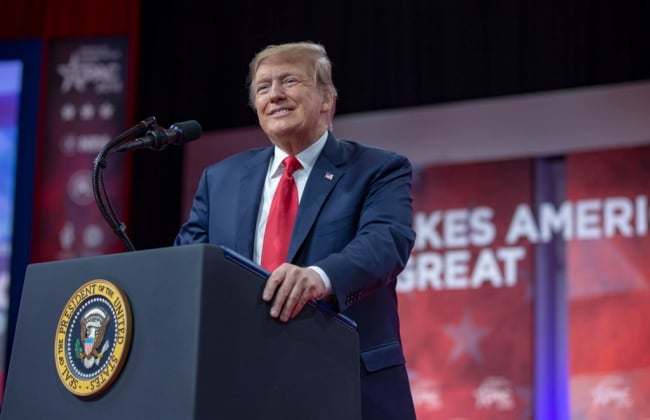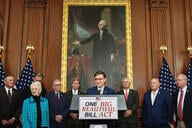You have /5 articles left.
Sign up for a free account or log in.

President Trump at CPAC last weekend
Getty Images
The White House is gearing up to introduce a promised executive order on free speech, perhaps timed to coincide with its proposed budget release next week. And the administration may tackle other higher education issues with its planned executive actions.
Several well-placed observers said the White House has for months been working to jointly release executive orders on risk sharing (requiring a financial stake for colleges based on students’ ability to repay loans) as well as on its plan for releasing program-level student outcomes data on a publicly available web tool like the College Scorecard.
It’s unclear if the Trump administration will be able to pull this off in a single budget-related public announcement. And sources couldn’t say what exactly might be included in the executive orders or if they would all be released together.
But despite the uncertainty, the White House apparently has been trying to bring the executive actions together for a joint announcement around the budget release.
President Trump last weekend vowed that an executive order linking the flow of federal research dollars to ensuring campus free speech was coming soon. And sources said Ivanka Trump, his daughter and a White House adviser, has been helping to develop the other potential executive orders. Ivanka Trump has been active on work-force development, including the administration’s efforts to create industry-recognized apprenticeships. And her office last year hired several staff members who have worked on issues related to the possible executive orders, sources said.
The White House declined to comment on the potential looming executive orders, referring to the president’s address last weekend to the Conservative Political Action Conference.
Trump was vague in the speech about how an executive order that would prod colleges to protect free speech might work and did not mention which government entity would enforce it.
"If they want our dollars, and we give them by the billions, they’ve got to allow people to speak," he said during his more than two-hour address.
However, conservatives in recent years have charted a path the White House might pursue.
An article National Affairs published last spring may have helped influence the administration’s interest in such an executive action.
The article’s co-authors were Frederick M. Hess, director of education policy studies at the American Enterprise Institute, and Grant Addison, then program manager for education policy studies at AEI and now deputy editor of the Washington Examiner magazine. They also wrote about the issue this week in an opinion piece for Inside Higher Ed.
“Taxpayer funds should not be subsidizing research at higher education institutions where the conditions of free inquiry are compromised,” Hess and Addison wrote for National Affairs, adding that “unfettered inquiry is foundational to the legal regime that governs the research relationship between higher education and the federal government.”
An executive order seeking to preserve free inquiry should focus on explicit speech codes that are on the books at many colleges and universities, they argued.
“Higher education institutions with formal policies that restrict, chill or punish constitutionally protected speech should therefore be rendered ineligible for federal research funding,” said Hess and Addison.
The White House might not opt to follow this advice. But if it does, Hess and Addison said such an executive order would be on firm ground historically and statutorily, as well as long overdue. And they said campuses have machinery in place to help ensure adherence to free inquiry.
A wide range of higher education leaders and academics have criticized the idea of linking free speech to federal research fund eligibility.
Such an executive order would be a “solution in search of a problem,” Terry Hartle, senior vice president for government and public affairs at the American Council on Education, said in an interview shortly after President Trump's Saturday speech. That’s because "free speech and academic freedom are core values of research universities," he said.
Program-Level Data and Risk Sharing
Even less information was available about where the Trump administration might go with possible executive orders on program-level student outcomes data or risk sharing.
Last year the U.S. Department of Education dropped the Obama administration’s so-called gainful-employment rule. Those regulations sought accountability for career education programs, mostly those offered by for-profit colleges, based on a measure of their graduates’ ability to repay federal loans.
Gainful employment came with a trove of program-level data. And while its sanctions didn’t come into effect before the Trump administration scuttled the regulation, many for-profits still dropped programs that were likely to fail the rule.
When it announced a planned overhaul for gainful employment last August, the department said it would give prospective students solid data they could use when considering college programs.
“The department plans to update the College Scorecard or a similar web-based tool to provide program-level outcomes including, at a minimum, median debt and median earnings for all higher education programs, at all Title IV participating institutions,” the feds said in a written statement. “The department believes that this will improve transparency by providing comparable information for all programs and helping students understand what earnings they might expect based on those of prior graduates.”
Getting such information won’t be easy. It would require data sources from multiple federal agencies. And adding those metrics to the College Scorecard poses technology challenges as well.
Yet department officials previously have promised that some program-level data, including on graduate earnings, will be publicly available this year.
Michael Itzkowitz, a senior fellow at Third Way, a centrist Democratic think tank, worked on the Scorecard’s creation as a department official during the Obama administration. He has welcomed the promised addition of program-level data but has said the bulked-up data won’t make up for the department’s diminished focus on oversight and outcomes under the Trump administration.
“Adding program-level data to the College Scorecard is great,” he said on Twitter in November. “However, it's not an equal substitute for the elimination of protections for students who enroll in low-performing higher education programs.”
The concept of expanded risk sharing in higher education generally has received increasing bipartisan interest in recent years. The concept revolves around holding colleges more accountable for the risks students and taxpayers take on with federal loans -- giving colleges more “skin in the game.”
However, it’s unclear what an executive order could do in an area that’s largely covered by federal legislation rather than by regulation or executive actions.
Some ideas that the White House might be considering on risk sharing, sources said, include those described in a 2015 paper by Senator Lamar Alexander, the Tennessee Republican who leads the Senate’s education committee.
One possibility, the paper said, would be for colleges to be required to assume financial liability based on a metric related to their graduates' ability to repay federal loans.
Higher education trade groups, led by the American Council on Education, in 2015 opposed the ideas Alexander described. "Far from incentivizing positive behaviors, this approach will instead penalize all students and institutions in an attempt to address the behaviors of a handful of bad actors," the groups wrote.
Sources said several federal agencies and Congress would need to be involved in creating a substantive executive order on risk sharing, even one that would be largely symbolic. They cited uncertainty around this possible order and possible ones covering program-level data and free speech, as well as the unpredictability of this administration, which previously has failed to make good on high-profile promises.
Yet several observers said the White House has long had plans for a broad suite of executive actions on higher education, beyond free speech. And they said next week’s budget release might be an ideal time for the administration to make those plans public.
-- Andrew Kreighbaum contributed to this article.




